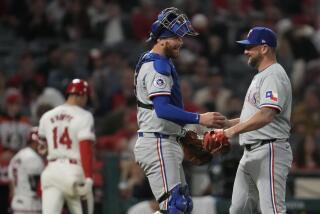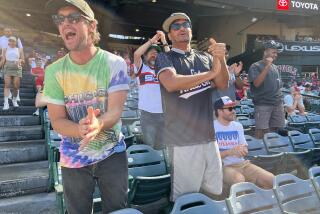Hard Day’s Night : Angels Played Into the Wee Hours Before Conigliaro Lost It, and A’s Won on a Bloop Single in 20th Inning 20 Years Ago
- Share via
Billy Cowan, journeyman outfielder, would like to forget the night he whiffed his was way into baseball’s record book. But history, not to mention a few friends, make that impossible.
Cowan, then with the Angels, struck out six times in a 20-inning game against the Oakland Athletics on July 9, 1971. It tied the major league record for most strikeouts in an extra-inning game.
“I was watching a game the other night that was taking a long time and one of the announcers mentioned my feat,” said Cowan, now a real estate investor. “My phone rang three times within 30 minutes. I remember. . . . So do my pals .”
But even without all the strikeouts, Cowan would remember. He may never be able to lose the image of a frustrated Tony Conigliaro ranting and raving, then being ejected from the game in the 19th inning.
In fact, it was Cowan who restrained Conigliaro after he struck out out for the fifth time.
No, that won’t be so easy to forget.
The Angels and A’s went 19 innings of futility before Angel Mangual blooped a two-out single to give the A’s a 1-0 victory. It was the longest 1-0 game in American League history.
Four other records were broken or tied that night, but the longest road game in Angel history might have slipped into oblivion had it not been for Conigliaro, who died last year.
In fact, most of the players cannot recall that game. What jogs their memory is . . .
“ . . . oh yeah, that was the night Tony Conigliaro retired.”
It was a thoroughly forgettable evening, galvanized by that one memorable moment.
“All I can remember is Tony throwing his equipment that night,” said Ken Berry, who was an outfielder for the Angels. “I’ve tried to block that season out of my mind. It was horrible.”
No other game could better sum up the 1971 season for the Angels. All the frustration, controversy and disappointment were there that night in Oakland.
The Angels were 16 1/2 games behind the first-place A’s, who would go on to win the West Division title. It was a title that was suppose to go to the Angels and, in fact, was “guaranteed” by General Manager Dick Walsh.
The previous season, the Angels challenged for the division crown. They had the league’s batting champion, Alex Johnson, and a 22-game winner, Clyde Wright.
When the Angels acquired Conigliaro from the Boston Red Sox during the off-season, they became the division favorites. Conigliaro, apparently recovered from a near fatal beaning in 1967, hit 36 home runs in 1970.
“I thought that was the last piece to the puzzle,” Walsh said. “Now we had a guy who could consistently hit the ball out of the ballpark.”
It was the first time the Angels gave their fans high expectations and the first time they disappointed them.
By July 9, Johnson had been suspended for lack of hustle. Shortstop Jim Fregosi, a six-time All-Star, was on the disabled list with a foot injury. And Conigliaro was hitting .222 with four home runs and 15 runs batted in.
“They were our 2-3-4 hitters,” outfielder Roger Repoz said. “We were in trouble.”
The A’s, on the other hand, were on the verge of a mini-dynasty. A year later, they would win the first of three consecutive World Series championships.
They had their own controversies and squabbles. They fought in the clubhouse, sometimes physically, but they also had a common bond.
“We all disliked (owner) Charlie Finley,” said pitcher Vida Blue, who started the game. “He kept us hungry. We wanted to prove we were worth the money he wasn’t paying us.”
They were two teams heading in opposite directions and they had a night not worth remembering.
“To tell you the truth, I can’t recall a thing from that game,” Oakland relief pitcher Darold Knowles said.
Knowles, perhaps fittingly, was the winning pitcher.
Rudy May, an inconsistent left-hander, started for the Angels just down the street from the neighborhood where he grew up in Oakland. He struck out 13 and gave up only three hits in 12 innings, none after the fifth.
“We couldn’t get him even one run, that shows you how our season was going,” second baseman Sandy Alomar said. “Rudy pitched great that night, better than even Vida.”
And Blue was on his game.
At the time, Blue was 17-3 and well on his way to being the American League’s most valuable player. He finished 24-8 with a 1.82 earned-run average and struck out 301.
Blue struck out 17 that night, tying a league record for left-handers that was broken by Ron Guidry in 1978.
“I remember Billy Cowan came back after his first at-bat saying, ‘This guy has nothing,’ ” third baseman Ken McMullen said. “Of course, Billy had just struck out on three pitches. I knew it was going to be a bad night.”
It was to be a long night as well, especially for Cowan. He struck out four consecutive times against Blue.
“The thing is, I felt great that night,” Cowan said. “I felt like I was going to hit every pitch. I kept thinking I would get Vida next time. But after the fourth at-bat, I was glad to see him leave the game.”
Cowan didn’t fare much better against the A’s bullpen.
“It got to be funny,” Wright said. “Billy would strike out, come back to the dugout and tell us, ‘Their pitchers aren’t that good.’ He kept us all laughing.”
All, that is, except Conigliaro.
While Cowan was able to laugh off his inability at the plate, the frustration boiled in Conigliaro.
“I was hitting behind Tony, so we were passing each other a lot that night,” Cowan said. “When he struck out, he would have to pass me on his way to the dugout. After a while I was saying stuff like, ‘Well, it’s my turn next.’ But Tony wouldn’t laugh. I watched him go from confident to semi-confident to total frustration in that one game.”
That, in a nutshell, was Conigliaro’s season.
In 1967, his career, not to mention his life, nearly came to an end when he was hit in the head by a pitch from Jack Hamilton. Conigliaro nearly lost the vision in his left eye and sat out the 1968 season.
He returned to hit 20 home runs in 1969, 36 the next year.
But Conigliaro never fit in with the Angels. A loner, he was ridiculed by some of the other players for being a complainer.
Never mind that Conigliaro played with a pinched nerve in his neck that required 20 cortisone shots during the season, some of his teammates viewed him as being soft. Once, they laid out his uniform on a stretcher and covered it with ketchup.
“Baseball players can be vicious,” McMullen said. “Tony complained a lot, and some of the guys thought he always made excuses.”
The game started well for Conigliaro. In the third, he made a running catch to take an extra-base hit away from Joe Rudi and save a run.
But he struggled at the plate.
Conigliaro struck out with runners on second and third in the fifth. He left runners on first and second in the eighth.
In the 11th, Conigliaro was asked to sacrifice, but couldn’t get the bunt down. With two strikes, he swung and missed, then ran to first when the ball got past catcher Dave Duncan.
Umpire Merle Anthony called him out and Conigliaro argued, claiming it was a foul tip.
In the 19th, Conigliaro was again asked to sacrifice. After fouling off two pitches, he was called out by Anthony, who said that he missed a bunt.
Conigliaro began to argue.
“We had been playing so long that it was kind of comical at first,” Cowan said. “But Tony got madder and madder. Finally, the ump had heard enough and threw him out. That really set Tony off. He took his helmet and hit it with his bat. It landed about 50 feet up the first base line.”
Said Wright: “That really got the fans going on Tony. They were yelling that it was the best contact he’d made all night.”
Four hours later, Conigliaro announced his retirement at an impromptu news conference at the hotel. He told reporters that he had “nearly lost his mind out there in the field tonight.”
Conigliaro also said that the vision in his left eye had so deteriorated that he couldn’t see anything in the center of the eye.
“When the pitcher holds the ball, I can’t see his hand or the ball,” he said.
None of the Angels knew he had quit until the next day. Manager Lefty Phillips was the only one to make a statement.
“The man belongs in an institution,” he said.
Conigliaro came back with the Red Sox in 1975, but retired again after 21 games. He was hitting .123. He suffered a heart attack in 1982, which left him in need of constant care. He died of kidney failure on Feb. 25, 1990.
Said Wright: “There are two things that stick out in my mind about that night. One was Tony losing it and then quitting. The other was that we went through about seven packs of chewing tobacco.”
The game dragged on past midnight. The A’s used 20 players, including pitcher Jim (Catfish) Hunter as a pinch-hitter, the Angels used 16.
There were 18 hits, but Angel catcher Gerry Moses had the only extra-base hit--a sixth-inning double. There were 43 strikeouts, a major league record, 26 of which were Angels, also a record.
The 20th was to be the final inning because of the league’s curfew. Under league rules, no inning can begin after 12:59 a.m.
“At that point, you just wanted someone to end it, anyone,” Repoz said. “It didn’t even matter which team won, we just wanted to go back to the hotel and get some sleep.”
In the end, it came down to Angel reliever Mel Queen and Mangual, a reserve outfielder.
“I got two strikes on him and had him set up for an outside fastball,” said Queen, now the director of player development for the Toronto Blue Jays.
“I threw it. His butt went one way and the bat went the other. I’m not even sure it was in his hands when it hit the ball. It landed 15 feet behind the infield and seven or eight inches fair.”
It was a lasting memory for Queen.
“Of course I remember that game,” he said. “I remember all my losses. Of course, that was the night Tony Conigliaro retired.”
The Records
Major league and American League records broken or tied in the 20-inning, 1-0 game between the Angels and A’s on July 9, 1971.
MAJOR LEAGUE
Billy Cowan struck out six times, tying the record for most strikeouts in an extra-inning game.
The Angels struck out 26 times, most by a team in an extra-inning game.
There were a total of 43 strikeouts, most by two teams in an extra-inning game.
AMERICAN LEAGUE
Vida Blue struck out 17, tying the record for most by a left-hander in an extra-inning game.
Longest 1-0 game in American League history.
More to Read
Go beyond the scoreboard
Get the latest on L.A.'s teams in the daily Sports Report newsletter.
You may occasionally receive promotional content from the Los Angeles Times.







